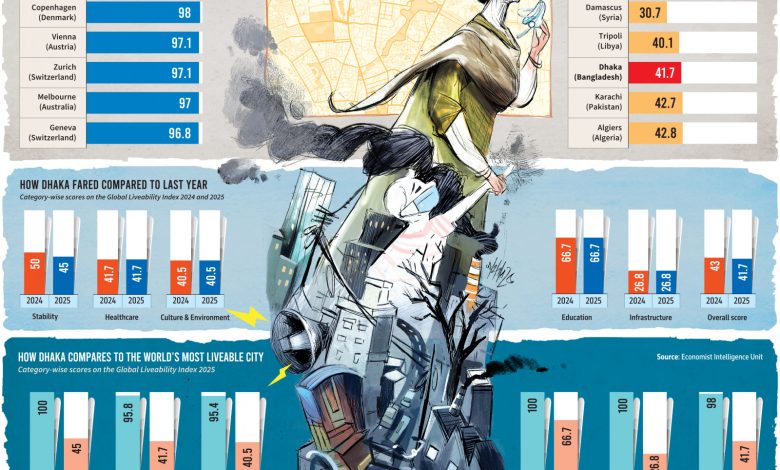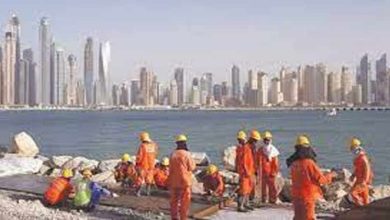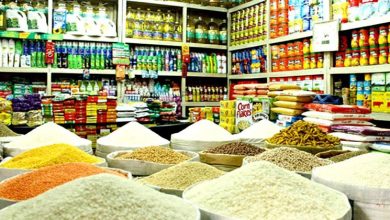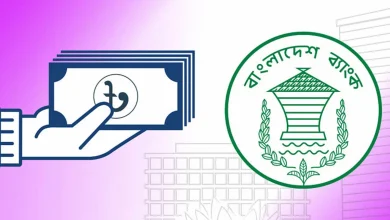GLOBAL LIVEABILITY INDEX 2025: Dhaka or Damascus? The tragic parallels in global rankings

Gleaming metro rails and expressways promise transformation, but they have not solved the city’s biggest problems — polluted air, constant traffic jams, overflowing sewage, weak healthcare, and a broken urban planning system
“This city of magic, this city of life— oh Dhaka!” goes the lyrics of a popular song by the Bangla band Chirkutt. Many of those who are deeply rooted to the city may relate to these words on an emotional level, but the reality paints a different picture.
Dhaka is home to over 10.2 million people. And for its residents, far from being a city of magic and life, the capital ranks only slightly better than war-ravaged cities like Libya’s Tripoli and Syria’s Damascus. This is not just a random comparison, but a reality reflected in statistics.
In the Economist Intelligence Unit’s Global Liveability Index 2025, Dhaka ranked 171st out of 173 cities — just ahead of the two conflict-ridden capitals.
Even after spending billions on megaprojects, Dhaka still ranks near the bottom. Gleaming metro rails and expressways promise transformation, but they have not solved the city’s biggest problems — polluted air, constant traffic jams, overflowing sewage, weak healthcare, and a broken urban planning system.
The questions are: What actually makes Dhaka so unlivable and what’s the way out?
Adil Mohammed Khan, president of Bangladesh Institute of Planners (BIP), points his finger at the government for this. He criticised the fact that after the mass uprising last year, there have been many discussions about reforms in the country, but little to no focus on how to make cities more livable.
“We have seen the state serving business interests instead of prioritising livability. Then there is no effective mechanism to ensure a functional local administration. Nothing has been done to make public transport more efficient — meanwhile, the city has been flooded with unsafe auto-rickshaws. All of this clearly shows that no one is truly concerned enough about the city,” he said.
However, development economist Dr Selim Jahan believes that to understand the breadth and depth of the problem, we must see it from a broader perspective with other indicators beyond a particular index.
“After independence, Dhaka became the centre of administration and the economy, attracting people from all over the country. The city grew rapidly, but without any proper planning. Limited land and poor infrastructure made it even harder to guide this growth in the right direction,” he said.
Now, physical development has become the main focus of the city’s growth. Large buildings are being built, waterways are being blocked, basic services are under pressure, and both air and noise pollution are getting worse. As a result, the quality of life in Dhaka is steadily declining,” he explained.
Infrastructure pulls Dhaka down
The annual index, released on 16 June, assesses 173 cities across five key categories — stability, healthcare, culture and environment, education, and infrastructure. This year, Dhaka scored 45 in stability, 41.7 in healthcare, 40.5 in culture and environment, 66.7 in education, and 26.8 in infrastructure — with an overall rating of 41.7.
A closer look at the index reveals the troubling depth of Dhaka’s crisis. Among the five assessed categories, infrastructure remains the city’s weakest link, scoring a dismal 26.8 out of 100 — unchanged from last year.
This category is based on indicators such as the quality of the road network, public transport, water provision, telecommunications and international links, and the availability of good-quality housing.
Stability has further eroded, with the score dropping five points to 45, reflecting the political turmoil and unrest that marked 2024.
Meanwhile, Dhaka received its second-lowest score in culture and environment, at 40.5 points. This category is based on indicators including humidity, social or religious restrictions, and the availability of cultural and sporting activities.
Healthcare follows, showing no sign of improvement, stagnating at 41.7. This score reflects the availability and quality of both public and private healthcare services. However, education emerges as Dhaka’s only relative strength, scoring 66.7 — the highest among the five categories — though this too remains unchanged from the previous year.
The way forward
Truth be told, everyone knows what needs to be done to make Dhaka more livable — it is all about taking action that leads to real change.
“One key step is to stop all forms of environmental pollution. But sadly, despite having so many advisors, we haven’t even been able to take unfit vehicles off the roads. Similarly, the government must take stronger action to shut down polluting factories,” said Professor Dr Ahmad Kamruzzaman Majumder, dean of Faculty of Science at Stamford University Bangladesh and Joint Secretary of Bangladesh Poribesh Andolon (BAPA).
Dr Selim Jahan said, “Urban development should also be aligned with environmental priorities to ensure sustainability. Also, effective measures must be taken to reduce noise pollution, which continues to harm public health and quality of life.
“One major move would be relocating numerous government offices and universities outside the capital to reduce pressure on the city. At the same time, local towns must be decentralised and developed with a focus on income-generating opportunities and the provision of essential social services,” he added.
Adil Mohammed Khan noted that the key challenge for any megacity is urban management and Dhaka is no exception. “But our problem is that we are only focused on large-scale projects while neglecting the importance of proper management. We also fail to look for simple, low-cost solutions to any problem,” he said.
As an example, he mentioned the government’s failure to make even the city’s playgrounds accessible to the public. He believes that as long as this compromising mentality persists, improving the city’s liveability will never be possible.







